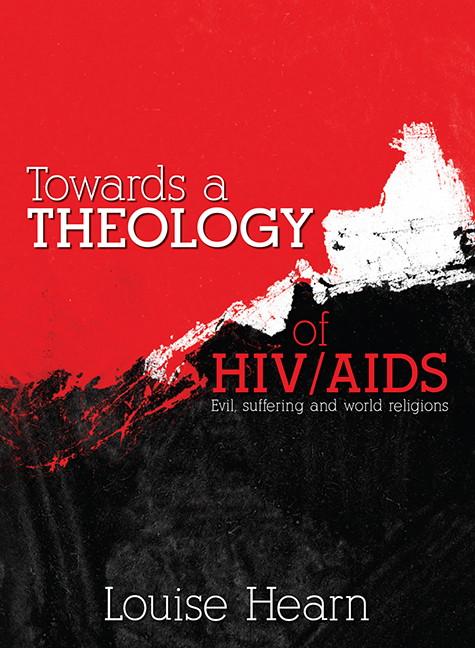Book contents
- Frontmatter
- Contents
- Foreword
- Chapter 1 Introduction
- Chapter 2 Evil and suffering
- Chapter 3 Inadequacy of theodicy
- Chapter 4 Understanding the interconnectedness of HIV/AIDS
- Chapter 5 Alleviating suffering due to AIDS
- Chapter 6 Towards a Theology of HIV/AIDS
- Appendix 1 Models for the interaction between text and reader
- Bibliography
- Index
Chapter 6 - Towards a Theology of HIV/AIDS
Published online by Cambridge University Press: 18 February 2020
- Frontmatter
- Contents
- Foreword
- Chapter 1 Introduction
- Chapter 2 Evil and suffering
- Chapter 3 Inadequacy of theodicy
- Chapter 4 Understanding the interconnectedness of HIV/AIDS
- Chapter 5 Alleviating suffering due to AIDS
- Chapter 6 Towards a Theology of HIV/AIDS
- Appendix 1 Models for the interaction between text and reader
- Bibliography
- Index
Summary
The extent of suffering due to HIV/AIDS is contrasted with other causes of suffering globally and is not treated in isolation but the responses and focus of suffering in the current global socio-political environment are comprehensively discussed. ‘Abantu Abaafa! – People are dying! People are dying. Children are being orphaned. The elderly are left uncared for. Already disgraceful poverty is made worse.’ Why should we be bothered by this? Is it not the case that the world is overpopulated anyway and maybe this is nature's way of balancing things out as the need has shifted away from manual labour in the technological age? Perhaps, therefore, fewer human beings are deemed necessary to perform work and our planet is becoming overpopulated to the extent that we are damaging the planet? Some might espouse such cold rationalistic thoughts, but from a humanitarian perspective as well as from a Christian perspective such viewpoints are sacrilegious. This is because all human beings are made in God's image irrespective of their degree of suffering or HIV status and their suffering is our suffering, their collective pain is collectively our pain. It is because we are the same human race, and because we live in an interconnectedness with God, other human beings and the created natural world through the work of the Holy Spirit therefore (in the words of Gallagher) ‘It is humanity that has AIDS, and not simply an isolated person.’
The HIV/AIDS problem causes individual human beings, families, communities, the African continent and the world, globally, to suffer and experience negative consequences. HIV/AIDS is a multifunctional problem and needs to be handled with an interdisciplinary approach. HIV/AIDS affects the social, physical, spiritual, and economic wellbeing of all; from those infected and their family and, through a ripple effect, on to their community, to their nation, to their continent and globally, the entirety of humanity.
McElrath links the impact of HIV/AIDS with the global economy thus:
The long-term impact of HIV/AIDS – sickness, death, and orphaning – on social and economic functioning and development is difficult to determine with accuracy but will include reduced productivity; pressure on managerial, professional, and technical expertise; greatly increased demand on health and welfare services; and reduced capacity to deliver. AIDS exacerbates poverty, hinders development, and radically changes dependency ratios.
- Type
- Chapter
- Information
- Towards A Theology of HIV/AIDSEvil, suffering and world religions, pp. 111 - 138Publisher: University of South AfricaPrint publication year: 2013



